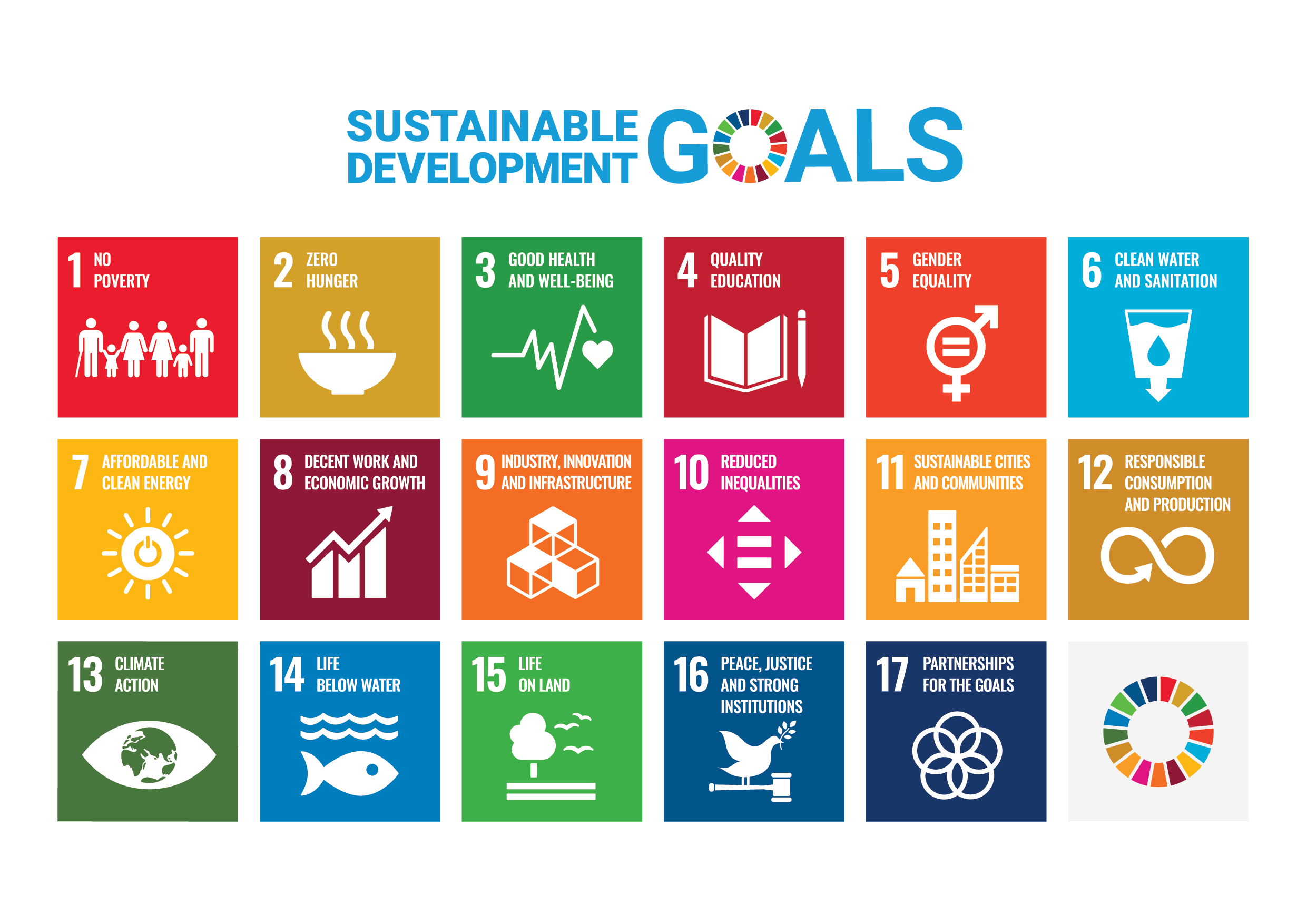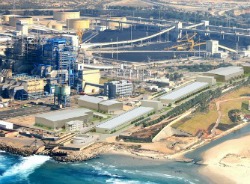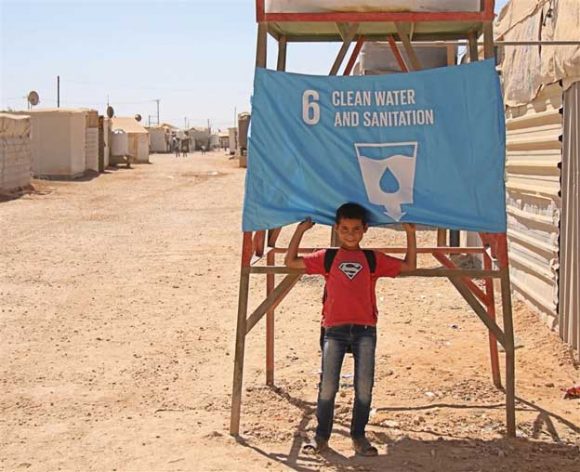Apr
18
Hindrance or Empowerment: How International And Domestic Factors Influence SDG Progress In MENA Region
April 18, 2024 | | 8 Comments
At the 2015 UN Summit, the United Nations implemented the 17 Sustainable Development Goals, which aimed to “end all forms of poverty, fight inequalities and tackle climate change, while ensuring no one is left behind” (United Nations n.d.). Throughout the MENA region, states have adopted various initiatives focused on advancing and achieving the 17 SDGs by the year 2030. While states desire to fulfill the sustainability goals outlined in the UN SDGs, international and domestic factors have influenced their progress, either through empowerment or hindrance.
International and domestic factors empower states to make progress towards the UN Sustainable Development Goals. First, international aid has allowed states with limited resources to be able to improve infrastructures and institutions and to have access to necessary resources. For instance, in the case of Jordan, the second most water-stressed country in the region, aid from international organizations such as USAID, has allowed Jordanian private and public sectors to develop public desalination facilities for municipal use as well as small private desalination facilities for drinking water and agricultural use. The construction of desalination facilities through the support of international aid has been significant for Jordan, as it has enabled Jordan to make progress towards SDG 6 – clean water.


Second, international attention/spotlight, such as hosting the World Cup games, has allowed Qatar to make progress towards SDG 8 – decent work and economic growth, since Qatar had to construct new infrastructure large enough to host theFIFA World Cup games. Given the need for new stadium infrastructure, this created more work opportunities for citizens in Qatar. Additionally, the presence of the FIFA games in Qatar allowed Qatar’s economy to grow, as Qatar developed its sports and media industries, through its streaming and reporting of the FIFA World Cup games.
Although international and domestic factors empower states to make progress towards the UN SDGs, these two factors can hinder progress as well. First, domestic conflict, as exemplified in the Syrian Civil War, can hinder progress. In Syria, the enduring stalemate has prevented the country from progressing towards SDG 3 – good health and well-being. Instead, well-being has been on the decline, as the use of vaccines has dropped from 98% to 70% in recent years. Additionally, access to doctors has drastically decreased since the conflict. Furthermore, the division of healthcare aid from international sources has been hindered due to territorial divisions across Syria. Each of these instances depict how domestic conflict within Syria has stunted progress towards good health and well-being and instead harmed progress.
Second, international crisis can hinder progress towards Sustainable Development Goals, as the population influx of refugees from Syria and Iraq significantly hindered Jordanian progress towards SDG 6 – clean water and SDG 8 – economic growth and decent work. For Jordan, the drastic increase in population numbers due to refugee migration impacted the country’s ability to provide clean water and sanitation to the whole population. Furthermore, given the population influx, less work opportunities were available, so unemployment numbers increased.
The states in the Middle East/North Africa region have strived to progress towards more sustainable economies as outlined through the 17 UN SDGs. While progress towards these goals have varied among countries due to international and domestic factors that either empower or hinder progress, the goal is for each of these countries to make significant progress by 2030.
Comments
8 Comments so far
Firstly, Caitlin, thank you for writing such an insightful blog post. Your comments on how hosting the World Cup games has propelled Qatar towards SDG 8: decent work and economic growth, were particularly enlightening. Your effort in highlighting the myriad ways the FIFA games have benefited the country is truly commendable.
It’s clear that hosting the World Cup games has been a game-changer for Qatar. The creation of new job opportunities for its citizens and the development of its sports and media industries are just a few of the positive outcomes. The presence of FIFA games in Qatar has undeniably propelled the country towards achieving SDG 8, painting a promising picture of economic growth.
However, it would be interesting and urgent to compare and contrast the impact of hosting the World Cup games on Qatar’s economy and the environment. While hosting the games has undoubtedly helped the country’s economy, concerns have been raised about the environmental and social impact of constructing the new stadiums required for the World Cup. After the FIFA World Cup ended, many newly built stadiums were demolished. There are also humanitarian issues related to underpaid construction workers who endure harsh working conditions. What does this tell us about Qatar’s progress towards SDG 8?
Lastly, do you think Qatar maintained the momentum gained from hosting the World Cup games to continue to grow and achieve its SDG 8 targets?
Thanks for the blog post, Caitlin, I enjoyed reading about what you had to say. First off, I really liked how you introduced the SDG’s in the opening paragraph, I thought that did a good job of giving the reader some insight and background for what the rest of the blog was going to be about. I also thought you mentioning the World Cup and all the good that has done for Qatar since they hosted it was very effective, and it was something that I had not thought of. Overall, I thought the way you organized this blog post was very effective and it made it easier for the reader to comprehend what you were discussing at various points throughout.
Hey Caitlin,
I thoroughly enjoyed reading your blog, it was all very insightful. The examples provided, such as Jordan’s advancements in clean water infrastructure with international aid and Qatar’s economic growth through hosting international events like the FIFA World Cup, vividly illustrate how external influences can positively impact SDG progress. Conversely, the devastating effects of domestic conflicts, as seen in Syria, and the strain of international crises, like the refugee influx on Jordan’s resources, underscore the challenges hindering SDG attainment.
I do have one question tho, What strategies do you believe are MOST effective in mitigating the hindrances posed by domestic conflicts and international crises to the progress of SDGs in the MENA region? This question I also struggled to answer so I would like to hear your opinions on this.
Thank you Caitlin for your blog post and engaging in answering the question on international and domestic institutions’ role in improving SDG goals. I have learnt some new things from this blog, considering your focus was on podcasts that I didn’t have the chance to fully listen to. You started off by highlighting some of the main and significant benefits of institutions. You mentioned that with international institutions, they have been able to intervene in matters where states have limited resources. You mention that in the case of Jordan, the development of small scale private desalination plants for drinking water and agricultural purposes and public desalination facilities for municipal use, has been made possible by USAID for both the public and private sectors. But my question is, to what extent has this been helpful?
In addition, you took note of the Qatar Fifa games which I thought was a very interesting focus. I was surprised you had more good things to say in terms of the job opportunities.
Your blog post effectively highlights the complex interplay of international and domestic factors in shaping the progress of MENA countries towards the UN Sustainable Development Goals (SDGs). Your examples from Jordan and Qatar illustrate the dual nature of these influences, showing both the benefits and challenges they bring.
International aid plays a critical role in addressing natural resource limitations, especially in water-stressed regions. For instance, USAID has supported Jordan in developing desalination facilities to achieve SDG 6. Similarly, Qatar’s infrastructural developments spurred by the FIFA World Cup have contributed to SDG 8. However, the Syrian Civil War shows how internal conflict can severely impede development efforts, especially towards SDG 3. The influx of refugees into Jordan has also strained resources, impacting the country’s ability to meet SDGs related to water and economic growth.
Your analysis emphasizes the need for a nuanced approach to international aid and domestic policies. While international aid and attention can catalyze progress, the specific contexts and challenges of each country must be carefully considered to design interventions that truly empower rather than inadvertently hinder progress.
Hi Rashid, thank you for your insightful response to my blog post, specifically on the effects of the World Cup games on Qatar’s progress toward achieving SDG 8. I think your point on the humanitarian and environmental issues is important to highlight. Viewing Qatar’s progress on SDG 8 from this lens helps to show that while Qatar may have made progress on SDG 8 in the process of building the stadiums, this progress was not long-lasting and sustainable. As you mention, once the stadiums were constructed, the job opportunities were no longer available. Also, the humanitarian concerns associated with the construction raises concerns, because while Qatar may have made progress on SDG 8, in turn they were harming the welfare and health of individuals in the process. Lastly, the destruction of the stadiums post-World Cup games raises environmental concerns, as land and natural resources were cleared for the construction of the stadiums just for it to be destroyed and left in rumble.
Hi Swarnim! Thank you for your thoughtful response to my blog post. Wow, that is a tricky question and one I might not successfully address either. I think domestic conflicts and international crises significantly hinder progress toward SDG achievements; however, I think one way to overcome these hindrances is through international cooperation. While international cooperation is difficult to achieve, I think regional cooperation is more attainable through the formulation of regional organizations such as the GCC. Given that sustainability issues impact almost every country in the world, collaboration through aid and humanitarian efforts can be useful in combating such issues.
Hi Amna! Thank you for your thoughtful response to my blog post. I appreciate your question regarding the efficiency of the public desalination stations in Jordan in helping the country progress toward SDG 6. While I am not 100% sure on how efficient the desalination efforts have been, my thoughts on the topic are: Jordan is the second-most water-scarce country in the region. This in itself is very concerning, so I think any attempt towards installing water stations or combating the water scarcity issue is helpful, given how much Jordan lacks a clean water supply. While I am not sure if the desalination stations are functioning as intended, I think any effort toward trying to combat the growing water crisis is commendable.